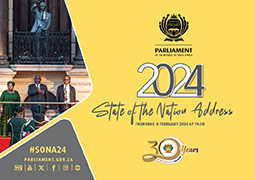
Delivering the last State of the Nation Address (SONA) of the sixth administration to a joint sitting of Parliament yesterday evening, President Cyril Ramaphosa said the government has taken a decision to establish a Climate Change Response Fund in order to counter the severe effect of global warming and climate change.
“This will bring together all spheres of government and the private sector in a collaborative effort to build resilience and respond to the impacts of climate change,” he said. This move is the government’s response to the severe climate- and weather-related events that South Africa has had to deal with over the past few years.
Here the President mentioned the wildfires in the Western Cape, floods in KwaZulu-Natal, unbearable heatwaves in the Northern Cape, persistent drought in the Eastern Cape, and intense storms in Gauteng. “While each of these events has left its mark, our country has weathered every storm. Yes, we have the scars to show. But in every case South Africans have been resolute,” he said.
The establishment of the fund comes soon after the passing of the Climate Change Bill last year and government participation in various climate-change-related multinational platforms, including the COP28 in the United Arab Emirates in December 2023.
In line with government’s strategies to decisively deal with climate change, President Ramaphosa announced that the government is planning to allow private investment in electricity transmission infrastructure. This work was supported also by the tabling last year of the Electricity Regulation Amendment Bill.
“As we undertake these reforms, we are positioning our economy for future growth in a world shaped by climate change and a revolution in green technologies,” President Ramaphosa emphasised.
He explained that the reason the government is implementing a just energy transition to green technologies (with financing pledges increasing from R170 billion to R240 billion) is because of the increase in extreme weather events over the past three years. This transition is not only intended to reduce carbon emissions and fight climate change, but to create growth and jobs.
“We will undertake this transition at a pace, scale and cost that our country can afford and in a manner that ensures energy security. With our abundance of solar, wind and mineral resources, we are going to create thousands of jobs in renewable energy, green hydrogen, green steel, electric vehicles and other green products.”
Sibongile Maputi
9 February 2024

